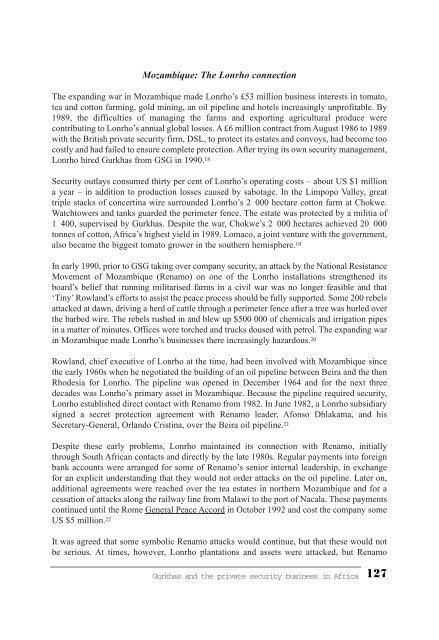Abbreviations - Institute for Security Studies
Abbreviations - Institute for Security Studies
Abbreviations - Institute for Security Studies
Create successful ePaper yourself
Turn your PDF publications into a flip-book with our unique Google optimized e-Paper software.
Mozambique: The Lonrho connection<br />
The expanding war in Mozambique made Lonrho’s £53 million business interests in tomato,<br />
tea and cotton farming, gold mining, an oil pipeline and hotels increasingly unprofitable. By<br />
1989, the difficulties of managing the farms and exporting agricultural produce were<br />
contributing to Lonrho’s annual global losses. A £6 million contract from August 1986 to 1989<br />
with the British private security firm, DSL, to protect its estates and convoys, had become too<br />
costly and had failed to ensure complete protection. After trying its own security management,<br />
Lonrho hired Gurkhas from GSG in 1990. 18<br />
<strong>Security</strong> outlays consumed thirty per cent of Lonrho’s operating costs – about US $1 million<br />
a year – in addition to production losses caused by sabotage. In the Limpopo Valley, great<br />
triple stacks of concertina wire surrounded Lonrho’s 2 000 hectare cotton farm at Chokwe.<br />
Watchtowers and tanks guarded the perimeter fence. The estate was protected by a militia of<br />
1 400, supervised by Gurkhas. Despite the war, Chokwe’s 2 000 hectares achieved 20 000<br />
tonnes of cotton, Africa’s highest yield in 1989. Lomaco, a joint venture with the government,<br />
also became the biggest tomato grower in the southern hemisphere. 19<br />
In early 1990, prior to GSG taking over company security, an attack by the National Resistance<br />
Movement of Mozambique (Renamo) on one of the Lonrho installations strengthened its<br />
board’s belief that running militarised farms in a civil war was no longer feasible and that<br />
‘Tiny’ Rowland’s ef<strong>for</strong>ts to assist the peace process should be fully supported. Some 200 rebels<br />
attacked at dawn, driving a herd of cattle through a perimeter fence after a tree was hurled over<br />
the barbed wire. The rebels rushed in and blew up $500 000 of chemicals and irrigation pipes<br />
in a matter of minutes. Offices were torched and trucks doused with petrol. The expanding war<br />
in Mozambique made Lonrho’s businesses there increasingly hazardous. 20<br />
Rowland, chief executive of Lonrho at the time, had been involved with Mozambique since<br />
the early 1960s when he negotiated the building of an oil pipeline between Beira and the then<br />
Rhodesia <strong>for</strong> Lonrho. The pipeline was opened in December 1964 and <strong>for</strong> the next three<br />
decades was Lonrho’s primary asset in Mozambique. Because the pipeline required security,<br />
Lonrho established direct contact with Renamo from 1982. In June 1982, a Lonrho subsidiary<br />
signed a secret protection agreement with Renamo leader, Afonso Dhlakama, and his<br />
Secretary-General, Orlando Cristina, over the Beira oil pipeline. 21<br />
Despite these early problems, Lonrho maintained its connection with Renamo, initially<br />
through South African contacts and directly by the late 1980s. Regular payments into <strong>for</strong>eign<br />
bank accounts were arranged <strong>for</strong> some of Renamo’s senior internal leadership, in exchange<br />
<strong>for</strong> an explicit understanding that they would not order attacks on the oil pipeline. Later on,<br />
additional agreements were reached over the tea estates in northern Mozambique and <strong>for</strong> a<br />
cessation of attacks along the railway line from Malawi to the port of Nacala. These payments<br />
continued until the Rome General Peace Accord in October 1992 and cost the company some<br />
US $5 million. 22<br />
It was agreed that some symbolic Renamo attacks would continue, but that these would not<br />
be serious. At times, however, Lonrho plantations and assets were attacked, but Renamo<br />
Gurkhas and the private security business in Africa 127
















